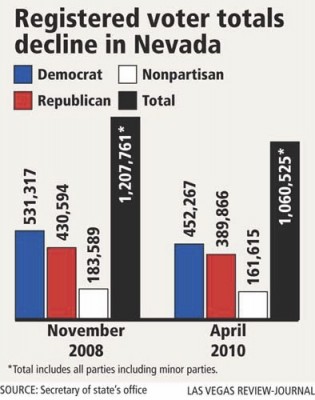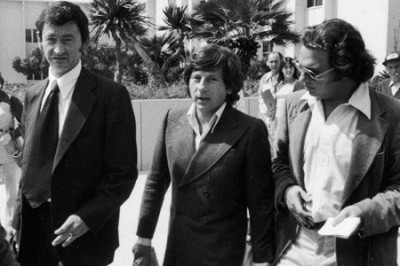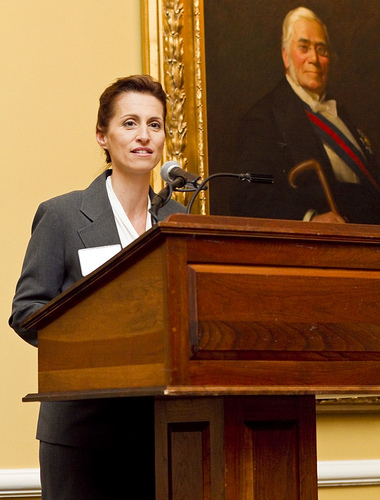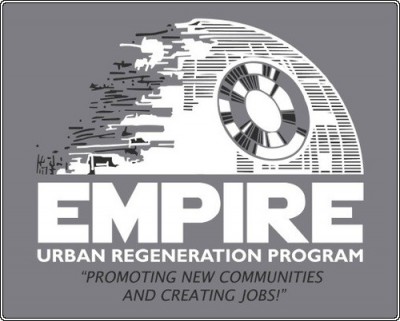Last summer, the Obama Administration got embroiled in controversy with the Henry Louis Gates, Jr. arrest and Barack’s comments about the Cambridge police. This summer, Andrew Brietbart set off a chain reaction with clips of a video at a NAACP meeting that he felt showed how a black USDA official, Shirley Sherrod, was expressing racist views. Here’s Brietbart explaining his position on Sherrod’s talk and his allegations that the NAACP audience was “applauding her overt racism”, although he also acknowledges how she draws distinctions between the “haves” and “have nots” in the context of the story::
Subsequently, the Obama administration pressured her to resign.
Well, as it turns out, the clip wasn’t the whole story. Sherrod’s talk in its entirety is about bridging the race gap and how she had to come to terms with her own feelings. In the aftermath, the wife of the white farmer that Shirley referred to in the video and helped, Elouise Spooner, came forward and said that she did right by them::
When the story broke, I saw it in Toronto on CNN, which was only showing clips which were damning and those outraged at Sherrod’s “racism” at a NAACP meeting. It was a jaw-dropping story, how it was framed, but I wasn’t all that surprised when I saw how the story was more complicated and not at all surprised to hear that the Obama administration is backpedaling after figuring out the rest of the story. Apparently, CNN jumped on the bandwagon, throwing caution and good journalism to the winds::
“CNN’s Rick Sanchez said producers there were intrigued by Biggovernment.com’s posting and immediately started reporting on it. But with all the questions involved — Was this a fair characterization of Sherrod’s full speech? Can she be reached to give her side of the story? — they wouldn’t be ready to discuss it on his afternoon show until Tuesday, he said.
By then, the story rushed by.
“As journalists, we have to protect ourselves the best we can,” Sanchez said. “It’s easy for it to happen to anybody, by the way — jump to a conclusion, get excited, look at the coverage. It’s kind of like creating a bandwagon effect. Once you get on the bandwagon, you can’t hit the brakes. According to the SF Chron::
“CNN’s Rick Sanchez said producers there were intrigued by Biggovernment.com’s [Brietbart’s] posting and immediately started reporting on it. But with all the questions involved — Was this a fair characterization of Sherrod’s full speech? Can she be reached to give her side of the story? — they wouldn’t be ready to discuss it on his afternoon show until Tuesday, he said.
By then, the story rushed by.
‘As journalists, we have to protect ourselves the best we can,’ Sanchez said. ‘It’s easy for it to happen to anybody, by the way — jump to a conclusion, get excited, look at the coverage. It’s kind of like creating a bandwagon effect. Once you get on the bandwagon, you can’t hit the brakes.'”
So, while CNN and Fox were both focusing on the reverse racism angle of this story, Fox’s O’Reilly kicks it up a notch. He cites several stories that the mainstream media didn’t cover as a journalism fail and evidence of a left-leaning bias. Bill practically accuses other networks of embracing a leftist agenda over giving the audience what they want::
All of this frenzy even duped the NAACP, which initially denounced Sherrod. While the media, politicians, and organizations are quick to jump the gun on incendiary bombs like this, what gets lost are the issues at hand on race and the Tea party movement. It gets convoluted, as even ousted Tea Party Federation activist Mark Williams defended Sherrod, as the controversy swirled. At around 7:30 EDT, there were two “highest rated” comments on the full video {link to all comments}, which shows that views are being expressed that show that people aren’t willing to follow a us-them mentality with respect to the Tea party movement and the NAACP::
“I am a white, Christian, Tea Party conservative from Texas….and I must say that while I appreciate much of Mr. Breitbart’s work, he really blew this one with his selective editing. I appreciated much of what Ms. Sherrod said about racial perspectives from all fronts. She sounded like she was sharing honest feelings based on her background, and how she came to terms with that. She should get her job back! Most of the Tea Party folks that I’m around would feel the same way.”—spastikmunkey
“I’m an Old (57) White Male. After watching this, I believe it is wrong for Mrs. Sherrod to lose her job. Yes, she had – and has – some racial issues – especially understandable given what happened to her father – but her heart is good and she has worked to overcome them and do the right thing. I’m all about grace and allowing people to grow. I only hope that blacks will give whites the same room and understanding. It’s the only way we’ll ever achieve racial reconciliation of any depth.”—lostcause53
The actions of CNN and {allegedly} the Obama administration, given USDA deputy undersecretary Cheryl Cook who phoned Shirley and told her the White House wanted her to resign since her comments were causing a controversy, show how the media and politicians are preoccupied with hype and spin, as opposed to getting the facts straight.
I think it’s easy to characterize any social movement in a stereotypical fashion, but I wonder how this plays out in an era of network politics. Where is the agency and what is the exact configuration of the Tea party movement when it comes to positions on race? Clearly, not everyone in the Tea party movement is on board with race as a wedge issue, but can any leader realistically speak for what is a confederation of localized grassroots activity?
Song:: The Style Council-‘Long Hot Summer’
Twitterversion:: [blog] Sherrod debacle highlights media & political #fail, but implications for social movements in networked politics? http://url.ie/6unp @Prof_K





 /p>
/p>


